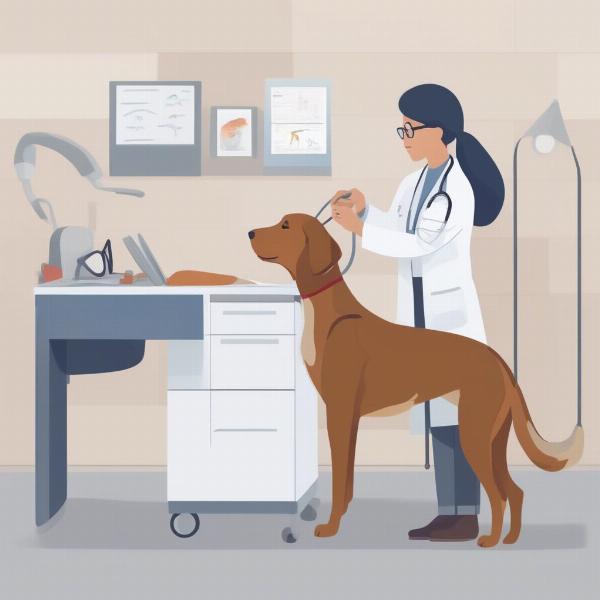Pronefra dog isn’t a recognized dog breed. The term “pronefra” likely refers to “pronephros,” relating to the embryonic kidney. This suggests the search may be related to kidney issues in dogs, particularly puppies. Let’s explore potential kidney problems in dogs and how to ensure your canine companion stays healthy.
Kidney disease in dogs can range from acute kidney injury (AKI) to chronic kidney disease (CKD). AKI occurs suddenly, often due to toxins, infections, or trauma. CKD, on the other hand, develops gradually, usually over months or years. Both conditions can be serious and require veterinary attention. Symptoms of kidney problems can be subtle, including increased thirst, frequent urination, lethargy, loss of appetite, and vomiting.
Recognizing Kidney Problems in Dogs
How do you know if your dog might have kidney issues? Early detection is crucial for effective treatment. Keep an eye out for these signs:
- Increased thirst and urination: This is often one of the first noticeable symptoms.
- Changes in appetite: Your dog might eat less or refuse food altogether.
- Lethargy and weakness: Kidney problems can make your dog feel tired and sluggish.
- Vomiting and diarrhea: These can be signs of toxin buildup in the body.
- Weight loss: Loss of appetite and digestive issues can lead to weight loss.
Diagnosing and Treating Kidney Disease in Dogs
If you suspect your dog has kidney problems, consult your veterinarian immediately. They will perform diagnostic tests, including blood and urine tests, to determine the cause and severity of the condition. Treatment options vary depending on the specific diagnosis and may include:
- Fluid therapy: To help flush out toxins and support kidney function.
- Medications: To manage symptoms and address underlying causes.
- Dietary changes: A special kidney diet can help reduce the workload on the kidneys.
Preventing Kidney Disease in Dogs
While some kidney issues are unavoidable, you can take steps to minimize the risk for your dog:
- Provide fresh water: Ensure your dog always has access to clean, fresh water.
- Avoid toxins: Keep harmful substances like antifreeze and certain medications out of reach.
- Regular veterinary checkups: Early detection is key to managing kidney disease.
- Maintain a healthy weight: Obesity can put extra strain on the kidneys.
 Regular Vet Checkups for Kidney Disease Prevention in Dogs
Regular Vet Checkups for Kidney Disease Prevention in Dogs
What to Feed a Dog with Kidney Issues
Dietary management is crucial for dogs with kidney disease. A kidney-friendly diet typically includes:
- Reduced protein: To minimize waste products that the kidneys need to filter.
- Restricted phosphorus: High phosphorus levels can worsen kidney damage.
- Controlled sodium: To help regulate blood pressure and fluid balance.
- Increased omega-3 fatty acids: To support kidney health and reduce inflammation.
Conclusion
While “pronefra dog” isn’t a breed, it likely points to concerns about kidney health in dogs. Recognizing the signs of kidney problems and seeking prompt veterinary care can significantly impact your dog’s well-being. By focusing on prevention and appropriate management, you can help your canine companion enjoy a long and healthy life.
FAQ
- What are the most common signs of kidney disease in dogs? Increased thirst and urination, changes in appetite, lethargy, vomiting, and weight loss.
- How is kidney disease diagnosed in dogs? Through blood and urine tests, and sometimes imaging studies.
- Can kidney disease in dogs be cured? While CKD is not curable, it can be managed with proper treatment and diet. AKI can be reversible depending on the cause and severity.
- What is the best food for a dog with kidney problems? A special kidney diet prescribed by your veterinarian, which is typically low in protein, phosphorus, and sodium.
- How can I prevent kidney disease in my dog? Provide fresh water, avoid toxins, schedule regular vet checkups, and maintain a healthy weight.
- Is kidney disease painful for dogs? It can be, especially in later stages. Managing symptoms and providing supportive care is crucial for their comfort.
- How long can a dog live with kidney disease? This depends on the severity of the condition and how well it’s managed. Some dogs can live for years with proper care.
ILM Dog is your trusted source for comprehensive information on dog care and well-being. We offer expert advice on breed selection, health and medical care, training, nutrition, grooming, and much more. For any questions or concerns regarding your dog’s health, contact our team of experts at [email protected] or call us at +44 20-3965-8624. Visit ILM Dog for more valuable insights and resources to help you provide the best possible care for your furry friend.